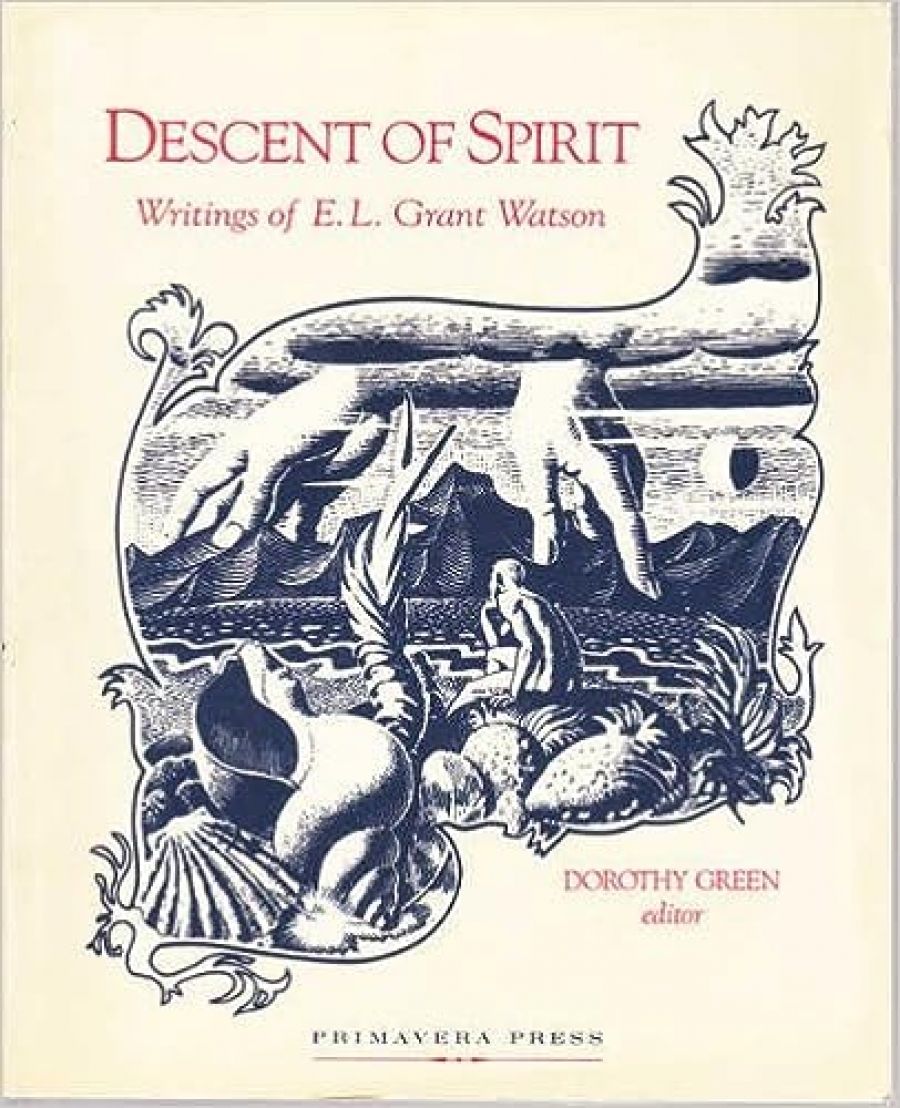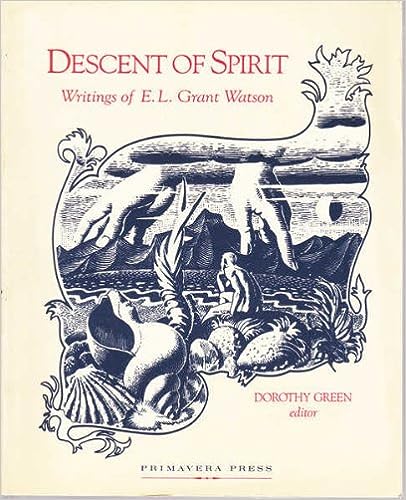
- Free Article: No
- Contents Category: Natural History
- Review Article: Yes
- Article Title: A Sense of Wonder
- Online Only: No
- Custom Highlight Text:
In his scientific foreword to Descent of Spirit, E. J. Steele, currently a Visiting Fellow at the John Curtin School of Medicine in Canberra, asks:
- Book 1 Title: Descent of Spirit
- Book 1 Subtitle: Writings of E.L. Grant Watson
- Book 1 Biblio: Primavera Press, 245 pp, $19.95 pb
- Book 1 Cover Small (400 x 600):

In fact, ‘A Sense of Wonder’ may have proved to be a more appropriate title for this unique collection, as the word constantly comes to the mind of the reader.
Elliott Lovegood Grant Watson (1885–1970) is described as biologist, nature writer, novelist, poet, psychoanalyst, traveller, metaphysician, and visionary, one of the most notable polymaths of the mid-twentieth century.
Dorothy Green, whose perspicacious essays on so many aspects of Australian literature are held in respect by those who read them, has edited this collection, and provides a twelve-page introduction to Grant Watson: ‘one of the most perceptive and imaginative writers ever to visit Australia ... and who published the first of his symbolic novels with a West Australian setting in 1914’. However, Watson’s claim to attention does not rest in his novels, though those on Middle Eastern themes attracted great interest among psychologists at the time of publication.
Hopefully, there resides in most of us a fascination with the physical world; this is as it should be because the physical world diminishes around us daily. As various species disappear from this fragile planet, it serves us well to take the time to examine the observations and conclusions of a man who had a unique vision; not confined to the tunnel, but freeranging, unfettered by convention and imbued with intuition, originality and, dare it be said, spirituality.
The impossible blend of art and science – arch enemies on the surface of it. And are we not celebrants of the surface of things?
Grant Watson took a deeper, clearer look at the behaviour of creatures and plants and endeavoured to provide his own explanations for what, on the surface, appears to be inexplicable.
The writing is not in a dry scientific vein but almost lyrical. In the essay ‘Unknown Eros’ he describes how he watched the copulation of two slugs. Yes, common garden variety, lettuceeating slugs. This unlikely topic becomes a piece of erotica and leaves the reader wondering about the adequacy of human expression of love/lust: ‘Surely no physical union between higher animals or humans was ever consummated with such completeness. Hardened and formal limb-shapes are incapable of such blending.’
There is a gentle humour in the writing. After studying the slugs, he noticed they were making off in the direction of his lettuce bed:
I could not be so ungrateful as to kill them after having watched their mating with such appreciation, nor could I be so bad a gardener as to let them be free to spawn in my soil and devour my seedlings. I put them in box and the next day took them into the country and let them go in a distant meadow.
‘Butterflies and Ants’, ‘Degenerate Birds’, Wise Worms’, ‘Mystery of Instinct’, ‘Dust’ and ‘Enigma of Physical Death’ are just a few titles in this collection. It is not necessary to possess a scientific understanding of zoology or biology to enjoy and appreciate these illuminating essays. Indeed, they could, serve the classroom well, running parallel to the drier volumes of natural history.
Australia seems to have entranced him and these essays are of particular interest. He draws an interesting comparison between the cultures of native Fijians and the Australian Aborigine. When he visited some of the Fijian islands he found himself ‘restless and anxious to get away’:
The atmosphere of that degraded cannibalism still persisted and was too strong for my faint spirit. Amongst the Australian Aborigines I had not this uneasy feeling. They were more primitive and less polite, but I soon grew to know myself secure among them.
He describes, with great eloquence and insight, a corroboree which left him with a sense of spiritual involvement in the spectacle, a sense of coming ‘nearer the earth through witnessing the interpretation of their tribal experience’.
In his epilogue, Grant Watson says:
While living with two companions in the wilds of the North Australian bush, I began in that strange and illuminating atmosphere of solitude and close contact with the impulses of nature to be aware of what lay behind, of what might be behind the world of wonder that my senses presented to me.
Wonder - there’s that word again: it permeates the entire collection and will leave the reader with a sense of wonder - at the world itself.


Comments powered by CComment